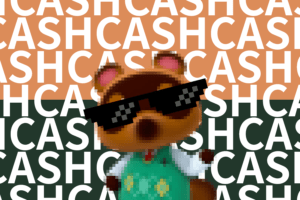A simple definition
Digital Marketing is the activity of marketing through any kind of electronic devices. It can help making more money.
A quick explanation
Digital Marketing is a branch of marketing and helps a business selling more/better by:
- Making sure people know they exist
- Making themselves likeable
- Creating, maintaining a relationship with their audience
No matter how well marketers try to make it cool, fun, trendy and likeable: it’s always been and it will always be about money.
Wait - how does being likeable and chatty help with making money?
That’s marketing. Have you bought any branded products lately? Why? If your answer is any of the following, it’s probably because of marketing:
- I like the product/style/name/brand
- It’s new/cool
- It was on deal/it was discounted
- Someone said/I read somewhere it was good
- They’re the best*
*Sometimes, they really are better: but were they worth their price, or did you really need the best?
Slightly less fun part below.
A more detailed explanation (but definitely less fun)
As it is part of the wider marketing field, Digital Marketing is also about making more money – not to be confused with Sales, where the goal is to make money, or Finance where they’re meant to save money. It doesn’t create value. It adds value to the business, the customer ends up paying more in one way or another.
If you’re not familiar with the idea of marketing, Wikipedia sums it up fairly well (in more technical terms):
Marketing is the business process of creating relationships with and satisfying customers. With its focus on the customer, marketing is one of the primary components of business management and Commerce.
Digital Marketing can be quick to deploy, reach many people and directly: someone looking at an ad on their smartphone is usually much more likely to see the ad than someone walking past a billboard. People generally have their smartphone at hand, tend to check it very often, and we are many to do so.
It reaches out to users in the digital world which exists in two dimensions (no pun intended): Online Marketing and Offline Marketing. Online Marketing covers any device connected to the Internet, and offline includes digital billboards or loyalty schemes in your favourite shops.
Some may argue that Digital Marketing doesn’t cover offline marketing, some others may say Radio and TV are part of it… for the sake of argument, let’s keep it simple! If we think of the word “Digital”, essentially, in the 21st century, it mostly means something with a screen that you can interact with up to a certain extent and usually online.
In summary, Digital Marketing:
- Is quick to deploy: no need to print or book an advertising time slot on TV
- Can reach many people directly: no need to send anything physical
- Is very likely to be shown: no need to worry about people not seeing it
Why Digital Marketing?
People spend a lot of time on their screen. A LOT of money is involved, a lot of money is made, and there’s more money to come.
Born with the gift of mag… technology
With the “recent” technological prowesses mankind has gone through spanning over the last 30-40 years, we invented new spaces where we can communicate… and as we live in such a society, some people jump at every opportunity to have more space to sell. Internet happens to be one of these places where there’s virtually unlimited space.
No one’s quite old enough yet not to know about TV, paper, radio, billboards or even sandwich men-advertising because they still exist (if you didn’t know, please look out your window).
On the other hand, some may be too young to realise advertising in the digital space is something fairly new. In one word: Internet.
We have grown to live digitally. We spend a lot of time in front of various screens (TV+phone+tablet+computer), in our own private life and at work. It’s become some kind of underworld:
- The average American adult spends over 11 hours a day staring at a screen. [Source: MarketWatch, 2018] That’s either a very good night of sleep, or roughly the time it takes to fly from Paris (France, not Texas) to San Francisco.
- The average French adult spends 4 hours a day. [Source: eMarketer, 2017] It’s so bad there’s a page dedicated to screen addiction on an official government website about drugs.
- Average yearly online spend per online customer in France is over 2,000€. [Source: JDN/Médiamétrie]
- There are ~3.3 billion smartphones in the world. [Source: Statista, 2019] That’s roughly one smartphone for every two living humans on Earth, and about 75% of the total Internet users in the world (although some people may own more than one phone).
What’s scarier is that these figures are still increasing year on year, and more products and services are available online by the minute. Healthcare, driving lessons, language learning, fortune telling, witch doctors, you name it, you have it.
The opportunity is evidently there to intrude, advertise and sell more, and judging by the trends, it’s not going to stop anytime soon.
Do you know why? Because it’s so easy to learn about you with the Internet.
Cookies, but not the American word for biscuits
TL;DR: The Internet knows a lot about you, thanks to some spies that your computer keeps.
Everyone collects data on the Internet. The explanation is always along the lines of “We’re doing this to tailor your browsing experience with us“. Yeah, well, while it’s partly true, some features definitely need your data to be collected, some others don’t, and they don’t bother explaining that clearly.
For instance, do you have an active, genuine Facebook account? They know some of the following:
- Your email address (to ensure you are that same person)
- Your age and location exactly or approximately
- Your interests and hobbies
- Webpages you’ve visited
While the first three are something you usually give to Facebook (or are easy for Facebook to guess anyway), the last one may not be so obvious. We’ll save the detailed stuff for another episode, but essentially, your computer hosts some spies willingly that analyse your online behaviour and sends the information back to whoever designed the spy.
That’s a cookie.
These cookies aren’t edible, by the way.
Incidentally, this website doesn’t track you which is why there is no cookie banner.
Mind your own business!
Skip to the next part if this gets a bit too difficult (or boring, I’m not judging).
Cookies are used for many reasons and are not limited to marketing uses.
They can help the cookie provider understand what you do on their website and therefore learn more about your interests and guess in a fairly accurate way how close you are into purchasing something.
Once they have enough data about you, they can tailor the message and send something relevant to your interests, so that you’re more likely to read. And you reading the message is already some kind of victory for advertisers.
Another example for the savvy online shoppers who use Amazon. Have you ever realised you tend to see ads in various places for a product you’ve seen recently? You’ll even see it on your phone if you’re connected to your Amazon account on your phone. Ads will appear on Facebook reminding you you’ve seen a product recently on Amazon.
How do you think they know you’re interested in the latest quiche cookbook or the newest smartphones? They track you.
However, there’s no need to be paranoid. Knowing is already a big step forward, and we’re all here for the knowing part!
In the case of EU residents, they are all protected by the GDPR (General Data Protection Regulation). It really is a lot of complicated stuff, but in simple words, any data about a EU resident is protected by the European Union.
If anyone obtains and/or manipulates private data without the owner’s consent, it is unlawful and they have the right to raise it with the relevant authorities as a breach to their private & individual freedom.
GDPR is the reason why you see those popups about Cookies with a huge “I accept your cookies” button, which is technically silly (but we’ll save that for later).
GDPR explained tells you everything you need to know about GDPR, and explains it better than I ever will!
What is Online Marketing?
Online Marketing covers any marketing activity tied to any device connected to the Internet.
Why Online Marketing?
With the Internet, people consume information very quickly, so while it’s easy to reach out, it doesn’t necessarily mean that people will find or engage with a brand/product/person.
Online Marketing helps identifying the right people to build a good relationship with on the Internet (so that they can sell stuff and make money).
There are many pillars in Online Marketing, including:
- Search Engine Optimisation (SEO)
- Search Engine Advertising (SEA)
- Pay-Per-Click Advertising (PPC)
- Social Media Marketing (SMM)
- Content Marketing
- Affiliate Marketing
- Native Advertising
- Email Marketing
Online Marketing explained with food and books
You may have heard of the pillars listed above, but you may not know what they all mean.
Cookies aside, let’s run through some of the biggest ones with food and books instead of technical terms because you’re probably tired of reading long posts with difficult explanations.
Search Engine Optimisation (SEO)
TL;DR: The art of making a web page appear on search engines (such as Google, Bing or Yahoo) without advertising.
Who does Search Engine Optimisation?
Any website can! It only costs time.
Who does it benefit?
Anyone who wants to increase their online visibility, for business reasons or just for the sake of being found.
Ok, but what does it do?
Imagine you’ve written a recipe book about quiches: “Quichemaster”. One day, someone goes to a book store, and asks the clerk the following:
What’s the best way of making quiche, honhonhon?
Wait a minute, French people don’t actually laugh like this. And we all know how to make quiches!
The shop clerk might get startled by their weird laugh, but they’ll point them towards the cooking section, and if they know something about it, they may recommend a book he knows – or even a recipe from a book they know about, if they’re really that enthusiastic.
Well, as an author, you might want to make sure that the shopkeeper (in order of priority):
- At the very least, knows about “Quichemaster”, the recipe book you’ve written
- Read your book or enough of it to understand what it’s about
- Understands your book enough to talk about it
- Likes your book
- Recommends your book instead of your evil competitors’ (because we can safely assume all competitors are evil)
If your book store person is honest, they will give an answer based on what they know and what they read. They may recommend one book over another, but as a professional bookseller, they’re not going to ditch any. At the end of the day, their goal is to make you stay and purchase something, but they’ll probably want you to purchase the best, most relevant (according to them) book.
After all, if they can’t provide you with a relevant suggestion, you may not come back to their shop next time.
There’s no single source of truth for a search engine; if you look at two dictionaries, they’ll give you the same definition of a word, but phrased differently. It’s the same for everything, it’s all about phrasing.
The future is now! You can talk to robots: it’s always been possible! ChatGPT wasn’t the first.
Actually, you have to talk to robots if you want to make your website known, although you’re never too sure how these robots understand you.
Search engines, such as Google or Bing, have robots that help people find different sources of information for a specific request. SEO is the part where you help them help people find one thing over another. It doesn’t matter if you’ve got the best information in the world, if no one knows about it, you might as well not exist.
SEO is the art (and not the science) of telling the search engine (bookseller) 1) your website (Quichemaster) exists 2) and it is better than everyone else’s.
As it’s not an exact science, it’s however hard to pinpoint what exactly is going to make the search engine favour you over someone else. It’s an established field, there are plenty of professionals working in it, but even within the best practices, people can disagree… so it’s a bit of a minefield.
If you want to go into even more details, I suggest you read this or that.
Spoiler alert: It’s technical and it’s boring if you don’t know what it’s about. Stay with me and my food explanations.
Note: While Search Engine Land doesn’t sell any product, they do sell advertising through sponsored content on their website. Moz develops and sells SEO tools but their content is (generally) trustworthy.
As a side note, this blog post was written without any SEO guidance. While I would love for this article to be read, I’m not speaking to the robots here, I’m speaking to you.
Search Engine Advertising (SEA)
TL;DR: Paying to make a web page appear on search engines (such as Google, Bing or Yahoo).
Who does Search Engine Advertising?
Anyone with an online presence and some money to spare for advertising.
A website is not needed, although having one is preferable.
Who does it benefit?
Businesses who have something profitable to sell in most cases.
Back to food now: imagine the shop clerk is actually not so honest (read up if you’ve skipped that part), and he actually takes bribes. They will mention whichever book given someone pays him every time he mentions it. Also, they don’t mind mentioning more than one recipe book, they’ll however give preference and priority to the person paying them the most.
Quality matters, but not as much as the money. Obviously, they’re not going to recommend to the latest disco encyclopedia because it has nothing to do with the initial question, but if that book has the slightest mention of quiche lorraine in it, they’ll find a way to talk about it, as long as they get paid.
Authors who didn’t pay can still be recommended, but they just have that little time to talk about other books before their customer gets bored. You could be the best chef with the best recipe in the world, they’re not going to talk about it before a while. Too bad.
You can pay these same robots so that they can help you convey a message every time someone enquires about something you want them to know about (= search query).
Today, search advertising is often done on Google platforms – Google Ads (previously AdWords) or YouTube, but there are also a few search engines we don’t necessarily think of, such as Amazon or Apple’s App Store. Examples below:
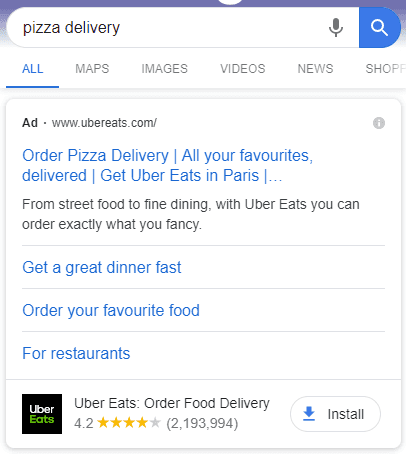
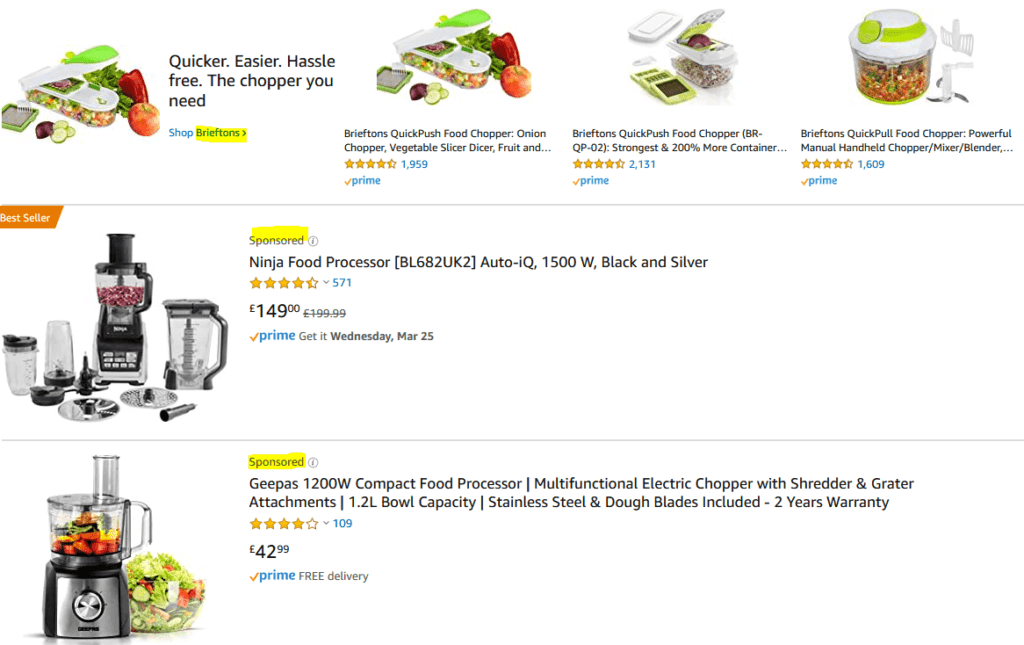
Whenever you search something on Google, you need to type words (or speak, thank you, Google Assistant). These words can trigger ads, as long as someone is willing to pay for it to happen, and click on one of these ads cost money to the advertiser.
Targeting can be very advanced, especially with the use of cookies. An advertiser can identify you indirectly thanks to Google’s omnipotent reach on the Internet and target you based on your interests, your locations (work, home, travel), your age, your gender, and even your behaviour on the advertiser’s website.
If you’re really curious or need to know more, here’s some further reading (but do you really want to do this to yourself?):
Note: Wordstream is a marketing solution provider and their content tends to be a bit commercial. It’s usually fairly thorough and beginner-friendly, if you put the salesy content aside.
I’m not one to toot my own horn (okay, maybe I do a bit, sometimes), but I’m good at Search Engine Advertising!
You might find me procrastinating participating on reddit, answering a lot of questions people ask about Google Ads, Bing Ads and even SEO.
Pay-Per-Click Advertising (PPC)
TL;DR: Online ads where the advertiser pays every time someone clicks on them.
To put it bluntly, PPC covers most of the advertising you can find on the Internet, including Search Engine Advertising (see above).
It’s a revolutionary system – well, it was when it came out, now it’s rather normal – in the way that the advertiser only pays every time someone actually clicks on their ads, so they have a certain guarantee of performance or at least visibility. It doesn’t matter whether an ad is shown one billion times or only twice, if no one clicks on it, it costs nothing.
PPC covers a wide-range of the ads you may have seen, including:
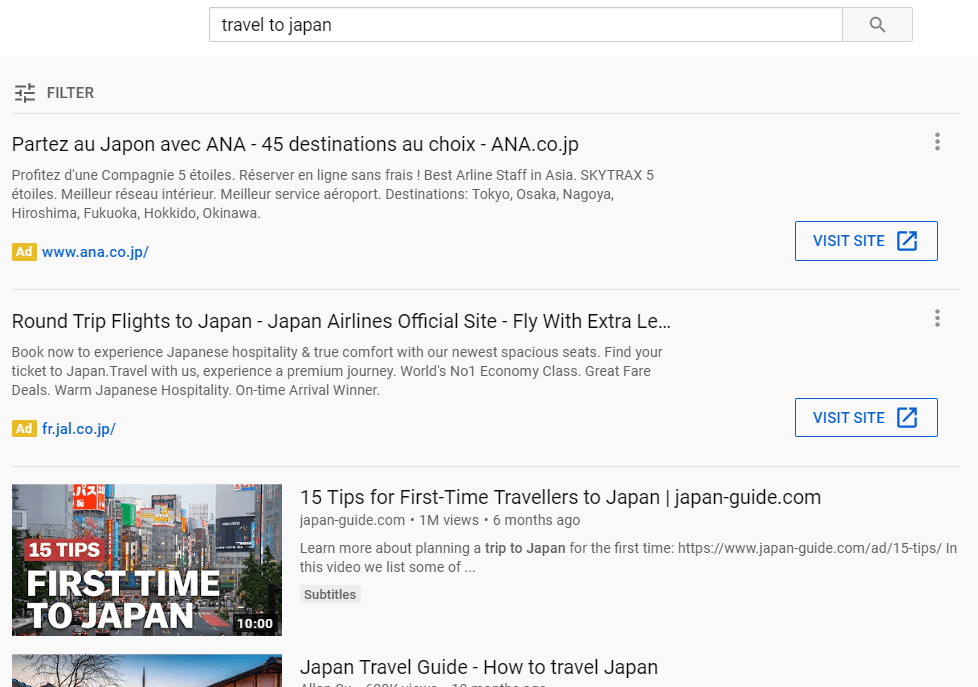

By the way, in the case of the last example above, the actual website (HuffPost) gets paid for showing these ads. You’ll find many of this kind of ads on blogs and media as they generate revenue, which partly explains why online media are so desperate to talk about the latest scandal.
Please remember to support your favourite bloggers/writers by enabling ads, you may or may not be against advertising, it only costs a bit of your comfort to enhance their livelihood!
We’re not going to go through the benefits/inconvenients of PPC, but if you must insist, you can read HubSpot’s thorough guide to PPC.
Note: HubSpot provides marketing solutions so their discourse will tend to encourage you to use their product. They produce nonetheless great quality content for beginners.
Affiliate Marketing
TL;DR: Businesses pay money to have people review and/or promote their products/services.
It doesn’t necessarily have to be an honest review.
Who does Affiliate Marketing?
- Price Comparison websites
- Media (independent niches & large media included)
- Bloggers
- Social Media influencers (Instagram, Facebook, Twitter…)
Who does it benefit?
Businesses who have something to promote. It’s usually easier to ask people to talk about your product than trying to promote it yourself, especially when it’s something relatively new.
Plus, the relationship between the audience and the business doesn’t need to be as deep since the middle person (the reviewer) vouches for the quality of your product.
You can think of it as athletes being sponsored by sportswear brands.
Well, it’s not so different from the other examples, actually.
Going back to the clerk, in this case, they can earn money from putting a product in the spotlight, or they could be incentivised for the sale of each product, as long as a partnership is established beforehand.
Wait, you guys are getting paid?
Yes, potentially. The amount really depends on how much authority (or fame) you have, and also on the compensation method:
- You could be paid for each sale you help generating.
- You could be paid for simply promoting a product.
- You could be paid each time someone sees the product you’re promoting.
Amazon is very famous for its Affiliate Marketing scheme where they reward the promoter for each sale they’ve helped making. Do you know any price comparison website? Some of them have a small “buy on Amazon” button – if you purchase a product through this button, they will get a small cut of the sale.
Wait again - did you just say people might be lying when they review products?
If anything, affiliates tend to get some kind of coupon/free trial deals, so there’s that.
By the way, it usually doesn’t increase the price directly for the end consumer (it’s already part of it!), but the promoter/reviewer still gets paid for that, so if there’s a blogger/reviewer you really like, you can always help them out this way, there’s little harm done.
Yes… and no, don’t worry, there are many honest reviewers! It’s a matter of integrity but reviewers also play a long-term game. They could probably make some money by lying, but if the product turns out to be much worse than how well they scored it, they will lose their audience, and therefore money. If they’re known for good reviews, they’ll get more visitors and therefore more money. Simple maths!
There are times the product is given away for someone to review it, but in most cases the reviewer will ensure they notify their readers. You can never really tell whether the reviewer is 100% honest or not, so it has to do with a relationship of trust between you, the reviewer but also the product/brand/service being promoted.
On the other hand, there are also cases where businesses pay consumers directly so that they leave a good review on their product, regardless of their quality, and other cases where the website doesn’t allow you to leave (or simply doesn’t show) bad reviews, so beware of product reviews in general.
Some websites have no purpose besides ranking high with SEO (see above) and putting their affiliate links forward to generate money. Unfortunately, that’s where search engines fail to recognise low quality, borderline “spammy” content vs. genuine content as the review content is usually generic and plain bad.
I’m not saying we should be paranoid about everything we find, but as for many other things, we need to check different sources to ensure we can build our own opinion!
Incidentally, there is no affiliate link on this website.
Email Marketing
TL;DR: Using emails to send promotional messages, related to a brand, a product and/or a service.
Who does Email Marketing?
Again, anyone can, as long as they have something to share.
A website is not needed (e.g. a local book shop without a website sends you an email about the latest releases you may be interested in), but can make it easier.
Who does it benefit?
Those who have something to promote, to share or to announce.
It allows businesses and other media to keep in touch with their audience directly, and therefore is very valuable since the message goes straight to their email inbox, a private space.
Now, back to our little clerk person and the quiches.
Your local bookstore wants to let you know about the latest releases, discounts and other news related to what you’re looking for. They know you’re interested in quiches, great!
They will only share those exclusive offers (they’re always exclusive!) with those who they really like… and they really like those they know about. But guess what? They like you, because you’re special! You only have to give them your address.
So… you give them your email address and with your approval, they start by greeting you to confirm they have the right information, and then starts sending promotional messages on a regular basis.
Ever wondered why there are so many online giveaways? Or why everyone encourages you to subscribe to their newsletter as you skim through an article? It’s so that they can reach you in the future. You wouldn’t give your email away if you were not interested in the giveaway or in the newsletter in the first place. If you give it away, it means that you have some degree of interest in what they’re talking about. It’s just a matter of time until they figure out how interested you are, but they can also accelerate the process and try to make you more interested in it.
That’s for the easy part of email marketing, really, it’s basically you receiving some catalogues or some offers through your mailbox, but you get to browse and order from your computer.
The complicated part is where email marketing is really smart now, with the use of cookies (read above) and all the subtleties of automated emails based on your online behaviour.
If you want to know more about Email Marketing, you can read some good stuff from Mailchimp.
Note: Mailchimp is an email marketing solution provider; they are definitely biased, but they explain the concept fairly well.
Another side note: I haven’t thought as far as making a newsletter.
Your kindest thoughts and your friendship are all that matter for now… keep your email for yourself.
What is Offline Marketing?
In the context of Digital Marketing, Offline Marketing (or just Marketing if you insist) covers any marketing activity tied to any electronic device without depending on the Internet.
Offline Marketing isn’t dead
While there has been a massive Internet boom over the past 20 years, it doesn’t mean more traditional marketing died down. They co-exist but offline marketing has to try harder to innovate in order to stand out a bit more, because we haven’t made that much progress in terms of non-connected devices… but that would be a bit unfair to say so.
From print to radio, radio to black & white TV, monochrome TV to colour TV, then to digital, HD, and now going towards the era of 4K HD, offline marketing is uniquely tied to entertainment and therefore doesn’t die so easily.
“Offline” Digital Marketing examples include:
- TV / in-movie advertising
- Radio advertising
- In-game / in-movie product placement
- Electronic / digital billboards
- SMS advertising
- Game / software demos discs
A small case about TV & Radio Advertising
In the case of TV advertising, the easiest way to prove that offline marketing isn’t dead is to look at the yearly spend on Super Bowl commercials.
The average cost of a 30-second commercial during the Super Bowl ranged from $37,500 at Super Bowl I, to around $2.2 million at Super Bowl XXXIV in 2000, and by Super Bowl XLIX in 2015, doubled to around $4.5 million. It was between $5.5 to $7 million in 2021.
While not “digital”, radio advertising is still very relevant, especially for drivers since it’s (supposedly) illegal to look at your phone and drive, but listening to radio is legal.
The average American person spends 152 hours every year in traffic jam. [Source: NYPost, 2019]
Radio ads last between 30 and 60 seconds, and there are ~15 of them every hour. That’s potentially enough airtime for over 2,000 ads a year!
It’s not dead, but is it close to dying?
TL;DR: No, companies still spend insane amounts of money in offline marketing.
Who remembers their Final Fantasy VII demo disc on Playstation, their free demo of Age of Empires II for Windows 98… or even Internet providers sending free trial discs? While some of the offline marketing methods died (or evolved, demos/trials became downloadable) and it’s also true we haven’t invented many new things lately, we’ve actually made a lot of improvements in terms of how the message is delivered.
It’s not just audio coming out of a radio, there’s also video and it’s now 3D, virtual reality, environment / atmosphere (e.g. Apple Store, McDonald’s and Starbucks all look very similar around the world) and more recently, scent which connects back to the wider marketing, with sensory marketing although that would be vaguely digital.
Side note: Many shops have been using scent marketing, notably Abercrombie & Fitch which have a very distinct perfume in their shop, but also other luxury brands including hotels, jewellery and technology.
Smell cannot be avoided, and it’s quite perceptible – think of the last time you craved for bread after smelling freshly baked bread, or coffee, for example!
Offline Marketing doesn’t get to play with interactions, it’s often a one-way communication in most cases. Because there is no interaction, the aim is to trigger an emotion instead.
Electronic billboards: Not dead & not dusted
Billboard may sound old-fashioned and electronic billboards probably do too, but we don’t mean illuminated billboards with flashy LEDs (for the sake of our environment, I sure hope it’s LED) and everything although it still seems to work down here in Japan:

but rather, fancy, animated billboards displaying on huge TV screens in shopping malls, airports and other trendy places:
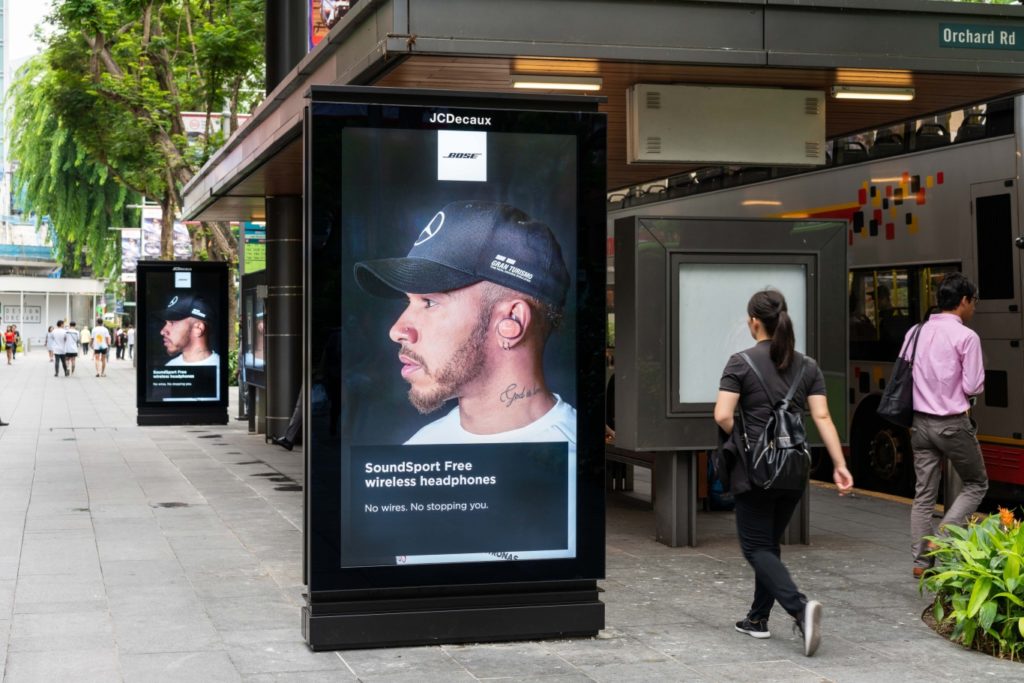
Some more advanced billboards include scent diffusers, motion tracking cameras, NFC chips, interactive games among other new, cool things… like giant 3D billboards in Tokyo.
Creativity never ends when it comes to finding new ways to spend and make more money.
Capitalism, ho!
Offline gets its ways to you
TL;DR: We’re getting more and more desperate for advertising space, so we grab every little opportunity to advertise.
It’s nothing new, really: in movies for example, you can very easily tell when there are product placements.
If you notice a brand on-screen, it usually means that someone paid for the placement. Otherwise you would never ever notice any brand in a movie as it would shift your attention towards the brand instead of the movie.
A sidenote with a list of some famous product placement examples in movies/TV:
- Back to the Future II (1989) and the self-lacing Nike shoes, which ended up being released for real. It was however for a good cause, so it’s not all bad (but remember? doing something good = promoting your brand image = marketing!).
- Everything in Wayne’s World (1992). Seriously.
- Toy Story, all of them – there are a lot of real-life toys! Each episode in the series is a godsend for toy makers.
It’s not something exclusive to the West:
- Shaolin Soccer (2001) featured a few product placements, notably Heineken or San Miguel in the karaoke scene.
- The infamous Suntory Whisky scene in Lost in Translation (2003) which was honestly quite long-winded (note: if anyone understood that movie, please let me know).
- Code Geass (2006) and C.C.’s love for Pizza Hut. In this particular case, Pizza Hut is clearly a sponsor for the anime series, they’re not trying to hide it.
- Tiger & Bunny (2011) and every hero sponsor. They’re all real-life brands: Pepsi, SoftBank, Gyukaku…
An odd case I found interesting to single out:
- Duff Beer, Homer Simpson’s favourite beer, started off as a fictional brand but is brewed all around the world. Oh yeah.
Product placements are not limited to movies and TV series as they also appear in video games.
These product placements can ruin the immersion and/or the credibility of a game. I don’t disagree, especially because these games already cost a fair amount of money to the consumer.
In some cases, it’s the other way round: companies pay for the licensing fee to increase the immersion/credibility of the game (e.g. car brands in a racing game, football team names in a football game, sportswear in a skiing game…).
Some memorable examples of product placement:
- In the case of Final Fantasy XV (2016), Vivienne Westwood is shamelessly mentioned a few times as she designed the deuteragonist’s wedding dress. The fashion designer even has a shop inside the game, and because money knows no border, they even seem to accept American Express. All the camping gear used by Noctis and his friends are from Coleman, and most oddly, you’ll also find Nissin’s Cup Noodle (that your character can actually eat) vendors at many unexpected places. Or even this. This might have gone too far.
- Death Stranding (2019) features extremely well rendered Monster canned drinks. I guess energy drinks survived the apocalypse, somehow.
- Mario Kart 8 (2014) in which Mario and his friends can drive a Mercedes-Benz. I’m pretty sure it’s out of place, but hey, anything goes in a fictional world, I suppose…
- EverQuest II (2004) had a /pizza command line which allowed you to order pizzas from Pizza Hut straight from the game. It wasn’t an April Fools’ joke.
Long story short, offline marketing is definitely not dead. Brands will always find a way to remind you they exist, and they’re not short on money. Few would say no to an extra bundle of cash, be it game developers or movie directors, especially when product placements tend to be very expensive.
Unfortunately, you’ll rarely see any benefit on the consumer’s wallet: product placements don’t make the final product any cheaper.
Offline Marketing is Emotional Marketing
TL;DR: The idea that associating an emotion with a product/brand/service helps you notice it, remember it, talk about it and buy it.
This is how we came up with ads starring babies to target mothers, or exaggerated toy ads for kids, although these are getting more and more regulated.
They could have advertised in a plain way (e.g. “these nappies are good!”), but adding the cuteness of a baby running on grass helps with building the image of a baby-friendly product.
It may sound sketchy, but an ad is meant to trigger something within you.
Offline ads are limited in terms of personalisation, so we look at the more basic human instincts. Anger, joy, sadness or surprise are emotions we share as human beings, and it’s an easy way to reach the heart of a consumer… which is why companies always try to find new ways to reach us (see scent marketing & sensorial marketing above).
A love & hate relationship between offline and online
While offline marketing doesn’t directly depend on the Internet, marketing campaigns today are very much thought on a larger scale. It’s part of a wider scheme where offline and online marketing support each other in the same campaign to enhance a brand’s image… and help making more money (which, again, is the ultimate goal of marketing).
A lot of large companies blend offline and online now. Disney is one that comes to mind: they are everywhere. The recently released Disney+ streaming service (online), movies (offline), Disney Channel (offline), and the blurring between their offline and online services, especially in their parks (e.g. you can’t purchase pictures at their parks now, you have to get them online!) ultimately drive the consumer towards not just purchasing, but purchasing more and maybe, better – it’s all about perspective.
A few words to end it all
Marketing is a broad world, but Digital Marketing is a whole beast by itself! Here’s a fun retelling of the digital marketing history by an agency I like.
Yet, people (and companies by extent) end up putting too much effort into doing one thing – whether it’s email marketing, SEO, PPC or anything – they tend to focus on one thing. Focussing on what works is great for delivering profit, but an integrated approach is the only way forward for growth. In the grand scheme of things, marketing works as a whole, and a strategy which combines efforts across channels works best.
Thanks for reading all or parts of this very long post!
I don’t know if I’ll ever have the courage to write that much again, but if I ever do, I’ll do it with as few memes as possible (THIS IS A LIE).
Questions? Comments? Discuss this over a barbecue? Looking for a fight? Ping me on Twitter or Reddit!
Main photo by Marvin Meyer via Unsplash



